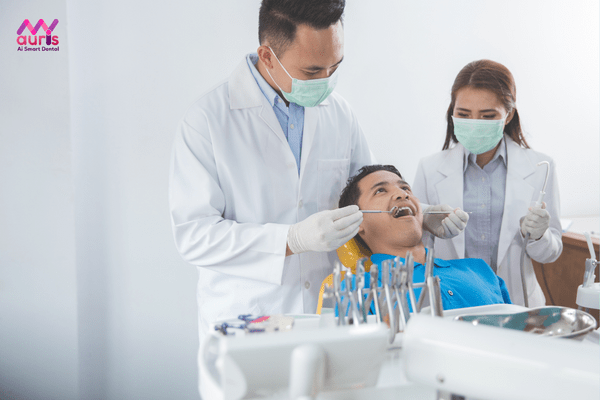When wisdom teeth grow, a series of symptoms will appear that affect oral health. Symptoms often last a long time because wisdom teeth do not grow at once but grow in waves that can last several days, weeks, or months. In the article, we will provide everyone with information to recognize the signs of wisdom teeth growing in the lower jaw.
When do wisdom teeth start to grow?
Wisdom teeth are tooth number 8 or the 3rd molar. This is the last tooth to grow when people reaching adulthood from 18-25. However, there are still people who grow earlier or slower than this age.
Wisdom teeth can grow normally, grow at an angle of 45 degrees, 90 degrees, or grow underground, grow backwards towards the jawbone, causing many oral health problems: pain, swollen gums, fever,…

In theory, there are a total of 4 wisdom teeth growing into the last 4 corners of the jaw. However, this number of teeth may vary depending on the person, because some people will only grow 1, or 2, or even some will not grow any wisdom teeth.
Signs of lower wisdom teeth growing
6 common signs of lower wisdom teeth growing include pain, swollen gums, difficulty moving the jaw, fever, headache, loss of appetite, and bad breath. The process of growing wisdom teeth does not take place continuously, so the symptoms will come in waves, affecting health:
Pain
This is the most common sign of wisdom teeth growing. The pain can cause discomfort and the inability to eat and chew normally or the persistent pain will cause insomnia. Usually, this pain will last until the tooth emerges from the gum.
If teeth grow straight, they will be normal after they grow straight and will not cause pain. Teeth that are crooked, slanted, or impacted will cause persistent pain.
Swollen gums
The gums around the roots of wisdom teeth will be swollen, and this condition lasts until the teeth grow stably. Because when reaching adulthood, the jawbone gradually becomes stiff and stops growing, so when teeth grow, the gums stretch, causing more swelling and pain.

Difficulty moving the jaw
When wisdom teeth grow, there will be a feeling that the jaw becomes hard and heavy.swelling, difficulty moving mouth muscles or speaking, smiling, eating, chewing, opening the mouth, etc.
Fever, headache
Common when teeth start to grow. The cause of fever is that when wisdom teeth grow, the body temperature increases higher than normal. Wisdom teeth are related to nerves, so when they grow, especially misaligned teeth, they will be compressed, leading to migraines on the side where the teeth grow.
Loss of appetite, loss of appetite
When wisdom teeth grow, you will feel pain when swallowing saliva and cannot open your mouth. Along with that comes toothache, fatigue, fever, loss of appetite and loss of appetite.
Bad breath
Wisdom teeth emerging will cause damage to the gum area. At the same time, bacteria and food plaque accumulate, wisdom teeth are in positions that are difficult to clean, leading to bad breath.
What to do when lower wisdom teeth grow
When wisdom teeth grow, they not only cause prolonged pain but also cause many uncomfortable feelings. Therefore, as soon as the first signs appear, people should:
Check their teeth
Wisdom teeth are hidden inside so it is difficult to observe, especially teeth that are crooked or impacted. Therefore, when unusual signs appear, you should go directly to the dentist to get specific advice and appropriate treatment direction from the doctor.
If wisdom teeth grow crooked, grow underground or complications appear, the doctor will take an X-ray to check the condition of the tooth. And the doctor will prescribe tooth extraction to overcome pain, restore chewing function, as well as protect other teeth.

Better oral hygiene
When in pain, people should rinse with salt water to disinfect, remove bacteria and plaque on their teeth. When the pain is reduced, still brush your teeth properly, combined with using dental floss to remove food and plaque,…
A reasonable diet
When there are signs of lower wisdom teeth growing, to reduce pain, you should supplement a healthy, scientific diet, especially adding green vegetables and fruits to provide the body with vitamins and minerals to help increase resistance. body, fighting the inflammatory process.
Avoid eating foods that are too hard or too chewy when wisdom teeth grow because they not only cause more pain but also easily get stuck in the teeth and are difficult to clean. From there, the risk of infection and tooth decay increases.
Limit eating high-temperature, spicy foods such as hot pot, soup, porridge or cold foods when wisdom teeth grow.
Should lower wisdom teeth be extracted?
Wisdom teeth cause a lot of trouble for the patient.everyone when rising. However, people are afraid and worried because wisdom tooth extraction is dangerous. In fact, what people worry about is completely valid because the roots of wisdom teeth have many nerves passing through them.
Normally, if wisdom teeth grow straight without causing any impact or invasion, the doctor will advise keeping the wisdom teeth. If the teeth grow crookedly, obliquely, underground, grow into tooth number 7, pierce the cheek, etc., the doctor will prescribe removal.
Extraction helps overcome pain as well as protects the remaining teeth from being affected. However, complex wisdom tooth extraction requires the technique and skill of the doctor as well as the quality of dentistry, clinic, and mechanical equipment.

If the doctor has poor skills and improper technique, it will damage neighboring teeth as well as cause high complications. At the same time, tooth extraction at a dental clinic that does not ensure quality, the clinic and tools are not thoroughly disinfected and sterilized will pose many risks of cross-contamination and infection, which is very dangerous.
The information in the article helps people grasp the information to recognize signs of lower wisdom teeth growing. From there, it helps people have timely solutions when wisdom teeth grow to reduce pain and complications as soon as possible. Because if wisdom teeth develop long-term complications, it will seriously affect not only oral health but also overall health. To know the exact information and condition, please contact My Auris dentistry immediately.





